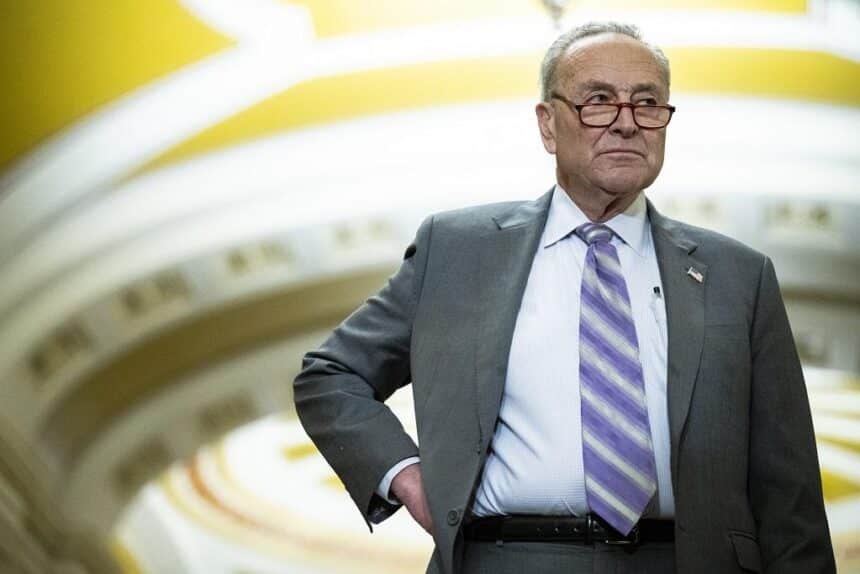Senate Majority Leader Chuck Schumer is pushing for comprehensive cryptocurrency legislation to be enacted by the end of 2024. This effort is aimed at ensuring the United States remains at the forefront of the global crypto revolution amid growing calls for clear and effective regulation. Schumer’s ambitious goal reflects a broader strategy to address the rapid evolution of digital assets and the need for robust security measures to protect users and the financial system.

The Push for Clarity in Crypto Regulation
Chuck Schumer’s latest push for crypto regulation comes in response to the escalating growth of digital assets and the associated risks. During a recent virtual town hall hosted by Crypto4Harris, a pro-crypto campaign supporting Democratic presidential candidate Kamala Harris, Senate Majority Leader Schumer emphasised the urgency of establishing a clear regulatory framework. Without such clarity, Schumer warned, the U.S. risks losing its competitive edge in the digital economy, potentially driving innovation to jurisdictions with lighter regulatory oversight.
In his address, the Senate Majority Leader highlighted the need to strike a balance between fostering innovation and implementing necessary guardrails to prevent misuse. The town hall also featured high-profile participants, including Senators Kirsten Gillibrand and Debbie Stabenow, Colorado Governor Jared Polis, and investor Mark Cuban. The consensus among the panellists was that a well-defined regulatory environment is crucial for the future of the crypto industry.
Political Strategy and the Role of Congress
Senate Majority Leader Chuck Schumer’s push for crypto regulation is not merely a reaction to technological advancements; it also reflects a strategic political manoeuvre. Having previously served as Senate Minority Leader, Chuck Schumer understands the significance of leading the charge on regulatory issues. His focus on crypto legislation underscores a broader political strategy to position the Democratic Party as a proactive force in the digital finance space.
Schumer’s efforts are mirrored by voices within Congress who are advocating for stronger regulatory measures. For instance, Florida Congressman Darren Soto, a member of the Congressional Blockchain Caucus, has called for action to address regulatory challenges. Soto has urged Vice President Kamala Harris to support the repeal of the U.S. Staff Accounting Bulletin 121 from the Securities and Exchange Commission (SEC) and to advance the FIT21 bill, which aims to provide clear regulations for the crypto industry.

This push for regulatory clarity is occurring against the backdrop of a shifting political landscape. With President Joe Biden stepping aside and paving the way for Vice President Harris, the Democratic Party is seeking to rebrand as more crypto-friendly. This contrasts with Republican candidate Donald Trump’s proposal to create a national Bitcoin reserve and his criticism of SEC Chair Gary Gensler, who has faced backlash from the crypto community for his stringent regulatory stance.
Chuck Schumer’s Strategy and Industry Reactions
The upcoming legislative battle will be closely watched by both the crypto industry and the general public. Senate Majority Leader Schumer’s strategy involves navigating a complex political environment while securing bipartisan support for his regulatory framework. The goal is to create a balanced approach that supports technological advancement while mitigating potential risks associated with digital assets.
Industry stakeholders are eagerly anticipating the outcome of Senate Majority Leader Schumer’s efforts. The introduction of comprehensive crypto legislation could set a precedent for how digital assets are regulated in the U.S., influencing both domestic and international markets. The effectiveness of the proposed regulatory framework will likely impact the future trajectory of the crypto industry, determining whether the U.S. leads in innovation or falls behind due to regulatory inaction.
Conclusion: The Crucial Path Forward for Crypto Regulation
As the deadline for comprehensive crypto legislation approaches, Senate Majority Leader Chuck Schumer’s efforts will be under intense scrutiny. The outcome of this legislative push could significantly impact the U.S.’s position in the global crypto market. Senate Majority Leader Schumer’s goal is to establish a regulatory environment that balances innovation with necessary protections, positioning the U.S. as a leader in digital finance.
With both political and industry stakeholders closely monitoring the situation, the resolution of this regulatory push will be pivotal for the future of digital assets in the U.S. Schumer’s success in navigating this complex landscape could redefine the role of the U.S. in the global crypto ecosystem and set new standards for regulatory approaches. For more updates on the latest developments in the crypto world, stay tuned to TheBITJournal.





























